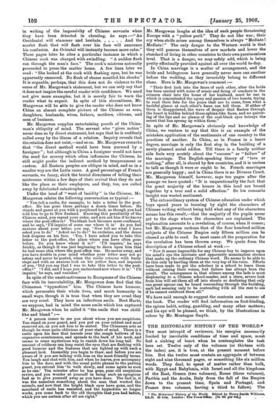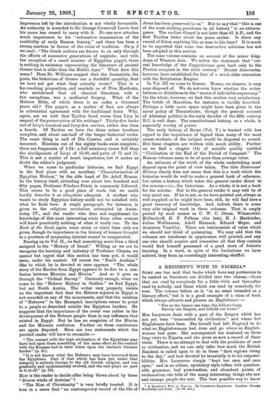THE HISTORIANS' HISTORY OF THE WORLD.* THE most intrepid of
reviewers, his energies necessarily limited by inevitable conditions of time and space, must feel a sinking of heart when he contemplates the task here set. Twelve only of the volumes (or thirteen with the index). are, it is true, at the present moment before him. But the twelve must contain an aggregate of between eight and nine thousand pages, or something like six million words. They deal, to speak of matter rather than bulk, with Egypt and Babylonia, with Israel and all the kingdoms of the East, Greece (two volumes), Rome (three volumes), Parthia and the Arabs, Italy from the fall of the Empire down to the present time, Spain and Portugal, and France (two volumes, leaving a third to follow). The • The Historians' History of the World. Edited by Henry Smith Williams, LL.D. 25 vols. London: The Times Mike.. Vs. 6d. per voI,. _
impression left by the introduction is not wholly favourable. An authority is accorded to Sir George Cornewall Lewis that his name has ceased to carry with it. No one now attaches much importance to his "exhaustive examination of the credibility of early Roman history," and there has been a strong reaction in favour of the value of tradition. On p. 2 we read : "The Greek authors are known to us only through the efforts of successive generations of copyists ; and with the exception of a small number of Egyptian papyri, there is nothing in existence representing the literature of ancient Greece that is older than the Middle Ages." What does this mean? Does Dr. Williams suggest that the dramatists, the poets, the historians of Greece are a doubtful quantity, that we have not got what they actually wrote ? This is a far-reaching proposition, and reminds us of Pere Hardouin, who maintained that all classical literature, with a few exceptions, was a mediaeval forgery. What of the Hebrew Bible, of which there is no codex a thousand years old ? The papyri, as a matter of fact, are always in substantial agreement with the traditional texts. Why, again, are we told that Tacitus fared worse than Livy in respect of the preservation of his writings ? Thirty-five books out of Livy's hundred and forty-five survive, rather less than a fourth. Of Tacitus we have the three minor treatises complete, and about one-half of the longer historical works.
The same thing is said of Dio Cassius, and is certainly incorrect. Nineteen out of the eighty books exist complete ; there are fragments of 1-24; a full summary (more full than the abridgments of Livy) of 55-60, and parts of 71 and 75.
This is not a matter of much importance, but it makes us doubt the editor's judgment.
When we come to particular histories, we find Egypt in the first place with an excellent "Characterisation of Egyptian History," by the able hand of Dr. Adolf Erman. In the history itself, extending over about two hundred and fifty pages, Professor Flinders Petrie is commonly followed.
This seems to be a good piece of work, but we could hardly describe it as altogether adequate. A student who wants to study Egyptian history could not be satisfied with what he finds here. A single paragraph, for instance, is given to the religious revolution attempted by Amen- hotep IV., and the reader who does not supplement his knowledge of this most interesting crisis from other sources will know practically nothing of what it really was. To the Book of the Dead, again, some seven or eight lines only are given, though its importance in the history of human thought in a province of surpassing interest cannot be exaggerated.
Passing on to Vol. II., we find something more than a third assigned to the "History of Israel" Willing as we are to recognise the learning and industry of Professor Cheyne, we cannot but regret that this section has been put, it would seem, under his control. Of course the "North Arabian" idea to which he is devoted at once appears. "The whole story of the Exodus from Egypt appears to be due to a con- fusion between Mizraim and Minim." And so it goes on through the "Critical Survey." Curiously enough, when we come to the "Hebrew History in Outline" we find Egypt, but not North Arabia. The writer very properly insists on the important fact that the Hebrew sojourn in Egypt is not recorded on any of the monuments, and that the mention of "Hebrews" in the Meneptah inscriptions seems to point to a people so described outside the Egyptian borders. He suggests that the importance of the event was rather in the development of the Hebrew people than in any influence that existed in Egypt. But he has no suspicion of the Mizrim and the Mizraim confusion. Further on these conclusions are again disputed. Here are two statements which the puzzled reader will have to reconcile :—
"The contact with the high civilization of the Egyptians may have had upon them something of the same effect as the contact with the Romans had in later times upon the barbaric German hordes" (p. 31).
"It is not known what the Hebrews may have borrowed from the Egyptians. Part of that which has been put under that category is entirely foreign to the old Jewish religion, and was gradually and spontaneously evolved, and the rest plays no part in it at all" (p. 59).
How is the reader to decide after being blown about by these "diverse winds of doctrine" ?
"The Rise of Christianity" is very briefly treated. It is true in a sense that "no contemporary record of the life of
Jesus has been preserved to us." But to say that "this is one of the most striking paradoxes in all history" is an extrava- gance. The earliest Gospel is not later than 62 A.D., and the first Pauline letter about ten years earlier. Is there any record of Solon anything like as near to his time? It is much to be regretted that some less destructive criticism has not been adopted in this section.
The same volume contains an account of the minor king- doms of Western Asia. We notice the statement that "our real knowledge of the Cappadocians goes back only to the Persian conquest in the sixth century." Recent discoveries, however, have established the fact of a much older connexion with the Babylonian Empire.
In Vol. III. we come to Greece. Homer, we observe, is very soon disposed of. We do not even know whether the writer believes or disbelieves in the "crown of indivisible supremacy." On the whole, however, we find this section very satisfactory. The battle of Marathon, for instance, is lucidly described. Perhaps a little more space might have been given to the naval policy of Themistocles, though the general account of Athenian politics in the early decades of the fifth century B.C. is well done. The constitutional history, as a whole, is especially worthy of praise.
The early history of Rome (Vol. V.) is treated with less regard to the importance of legend than many of the most recent students of the subject would be disposed to accord. But these chapters are written with much ability. Further on we find a chapter (14) of notable quality entitled "Civilization at the End of the Period of Conquest." The Roman volumes seem to be of more than average value.
An estimate of the worth of the whole undertaking must depend upon the point of view taken. The title Historians' History clearly does not mean that this is a work which the historian would do well to make a general book of reference, but rather a history which takes the general reader direct to the sources,—i.e., the historians. As a whole, it is not a book for the scholar. But to the general reader it may well be of very great use. If he is not, as we have pointed out, always as well supplied as he might have been, still, he will find here a great treasury of knowledge. And, indeed, there is some very able original work in these volumes. That is amply proved by such names as C. W. C. Oman, Wilamowitz- Mollendorff, H. F. Pelham (the late), H. J. Mackinder, Julius Wellhaosen, Adolf Harnack, Eduard Meyer, and Arminius Vambery. These are testimonials of value which we should not think of gainsaying. We may add that the volumes are handsome in appearance, well printed, and any one who should acquire and remember all that they contain would find himself possessed of a good store of historic learning. In a word, in spite of the limitations we have noticed, they form an exceedingly interesting shelfful.





















































 Previous page
Previous page